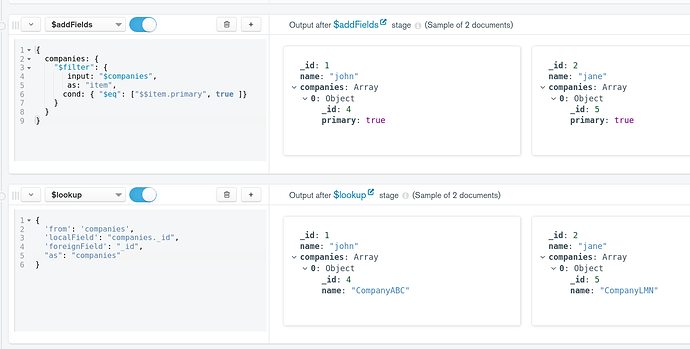How do i join user with company that are primary to the user? see below for sample the data.
db.companies.insert([
{ "_id" : 4, "name" : "CompanyABC"},
{ "_id" : 5, "name" : "CompanyLMN"},
{ "_id" : 6, "name" : "CompanyXYZ"},
])
db.user.insert([
{
"_id": 1,
"name": "john",
"companies": [
{
"_id": 4,
"primary": true
},
{
"_id": 5,
"primary": false
},
{
"_id": 6,
"primary": false
}
]
},
"_id": 2,
"name": "jane",
"companies": [
{
"_id": 4,
"primary": false
},
{
"_id": 5,
"primary": true
},
{
"_id": 6,
"primary": false
}
]
},
])
I tried doing this below but it returned empty.
db.users.aggregate( [{
'$lookup' => [
'from' => 'companies',
'let' => ['company' => '$companies'],
'pipeline' => [
[
'$match' => [
'$expr' => [
'$and' => [
['$eq' => ['$_id', '$$company._id']],
['$eq' => ['$$company.primary', true]]
]
]
]
]
],
'as' => 'actualCompanies',
]
}]
steevej
June 16, 2022, 6:06pm
2
Can a user have more that one primary?
I would do that in 2 stages:
a $set stage that $reduce the user’s companies to the primary
do a normal $lookup using the field created in the $set stage above as localField
Should be easier to debug since you can stop after stage 1 and see if the $set field works correctly. Then it is a trivial $lookup.
1 Like
To keep things simple, I would do it like that.
[
{
'$addFields': {
'companies': {
'$filter': {
'input': '$companies',
'as': 'item',
'cond': {
'$eq': [
'$$item.primary', true
]
}
}
}
}
}, {
'$lookup': {
'from': 'companies',
'localField': 'companies._id',
'foreignField': '_id',
'as': 'companies'
}
}
]
There is probably a way to make it work with the subpipeline like you tried, but apparently I’m not good enough just yet.
Cheers,
2 Likes
thanks Steevej, got the idea now. its pretty much like what MaBeuLux88 suggested below.
2 Likes
@ MaBeuLux88 Thanks, this is how i ended up using.
1 Like
Just before i close this topic, let me clarify that the solution i initially tried is actually legit and would work, i just messed up the ‘$expr’ part. see below for the corrected code:
'$expr' => [
'$and' => [
['$eq' => ['$companies._id', '$company._id']],
['$eq' => ['$companies.primary', true]]
]
]
I just replaced the ‘$_id’ with ‘$companies’ then the ‘$$company.primary’ with ‘$companies.primary’. I was just confused and forgot that i was joining companies to users, not users to company. see full code corrected code below:
db.users.aggregate( [{
'$lookup' => [
'from' => 'companies',
'let' => ['company' => '$companies'],
'pipeline' => [
[
'$match' => [
'$expr' => [
'$and' => [
['$eq' => ['$companies._id', '$$company._id']],
['$eq' => ['$companies.primary', true]]
]
]
]
]
],
'as' => 'actualCompanies',
]
}]
But moving forward i’d probably be using the staged method as suggested by @steevej . Thanks for the replies…
1 Like
I got the same confusion when I tried! I’m glad you got it to work.
1 Like
system
June 22, 2022, 2:19am
8
This topic was automatically closed 5 days after the last reply. New replies are no longer allowed.



